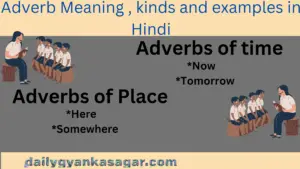इस लेख ” Adverb Meaning , kinds and examples in Hindi ” में आप adverb के बारे में समझने वाले है ।
क्रिया विशेषण समझने में तकलीफ महसूस हो रही है तो आज का लेख आपके लिए है इसमें आपको क्रिया विशेषण क्या है , क्रिया-विशेषण के कितने भेद हैं?और वाक्य में इसे कैसे इस्तेमाल किया जाता है आपको अच्छे से समझ आ जाएगा ।
क्रिया विशेषण की परिभाषा –
Contents
- 1 क्रिया विशेषण की परिभाषा –
- 1.1 क्रियाविशेषण के प्रकार (Types and examples of adverbs in Hindi)
- 1.1.1 (1)समयवाचक क्रिया विशेषण (काल वाचक क्रिया विशेषण) :-Adverbs of Time
- 1.1.2 2 .आवृत्ति/संख्या का क्रियाविशेषण (Adverb of frequency/number )
- 1.1.3 ( 3). स्थान वाचक क्रिया विशेषण (Adverb of place)
- 1.1.4 (4) रीति वाचक क्रिया विशेषण (Adverb of manner)
- 1.1.5 5. डिग्री या मात्रा का क्रिया विशेषण (adverb of degree or quantity) :-
- 1.1.6 (6). प्रश्नवाचक क्रियाविशेषण ( Interrogative adverb )
- 1.1.7 (7). संबंधवाचक क्रियाविशेषण (relative adverb) :-
- 1.1.8 (8). पुष्टिकरण और निषेध क्रियाविशेषण
- 1.1.9 (सकारात्मक या नकारात्मक क्रियाविशेषण) :-
- 1.2 Best Book for English learning
- 1.1 क्रियाविशेषण के प्रकार (Types and examples of adverbs in Hindi)
- 2 Author
Adverb वो शब्द होते है जो verb, adjective या दूसरे adverb को modify करते है . आसान शब्दो को कहो तो verb, adjective या दूसरे adverb की अतिरिक्त जानकारी प्रदान करते हैं ।
Note :
किसी क्रिया, विशेषण या अन्य क्रिया विशेषण की विशेषता बताने के लिए क्रिया विशेषण का इस्तेमाल करते है जबकि संज्ञा या सर्वनाम की विशेषता बताने के लिए विशेषण का प्रयोग करना पढ़ा जाता है ।
क्रियाविशेषण के प्रकार (Types and examples of adverbs in Hindi)
(1)समयवाचक क्रिया विशेषण (काल वाचक क्रिया विशेषण) :-Adverbs of Time
समयवाचक क्रिया विशेषण वह शब्द होते हैं जो किसी क्रिया को करने के समय को बताते हैं ,ऐसे शब्दों से वाक्यों की स्पष्टता बढ़ जाती है ।
Examples of Adverbs of Time
1 .Now – अब
He is eating food now.
वह अब खाना खा रहा है.
Are you reading newspaper now ?
क्या आप अभी अखबार पढ़ रहे हैं?

2. Later (बाद में):
We will go to the park later.
हम बाद में पार्क जायेंगे ।
Can we discuss this critical issue later?
क्या हम इस गंभीर मुद्दे पर बाद में चर्चा कर सकते हैं?
3. Yesterday ( कल):
I finished my homework yesterday.
मैंने कल अपना होमवर्क ख़तम किया।
I saw a horror movie yesterday.
मैंने कल एक डरावनी फिल्म देखी।
4. Today ( आज )
Today, I will go to my grandparents
आज मैं अपने दादा-दादी के पास जाऊंगा ।
Today ,I have learnt many things.
आज मैंने बहुत सी बातें सीखीं।
5. Tomorrow ( कल ):
We have a test at school tomorrow .
कल स्कूल में हमारी परीक्षा है ।
We will have an urgent meeting tomorrow.
कल हमारी एक जरूरी बैठक होगी.
6. Soon (जल्दी):
The school bus will arrive soon.
स्कूल बस जल्दी आएगी ।
I will tell my decision soon.
मैं जल्द ही अपना फैसला बताऊंगा.
7. Before ( पहले):
Finish your dinner before watching TV.
टीवी देखने से पहले अपना डिनर ख़त्म करो ।
I explain the whole matter before she ask me
इससे पहले कि वह मुझसे पूछे, मैं पूरा मामला समझा देता हूं ।
8. After (बाद में):
We will play in the park after school.
हम स्कूल के बाद पार्क में खेलेंगे।
We will make a project after this work.
इस काम के बाद हम एक प्रोजेक्ट बनाएंगे.
9. Never (कभी नहीं):
She never forgets to say thank you.
वह शुक्रिया कहना कभी नहीं भूलतीं ।
I never give them a grand party.
मैं उन्हें कभी भव्य पार्टी नहीं देता.
2 .आवृत्ति/संख्या का क्रियाविशेषण (Adverb of frequency/number )
संख्या क्रिया विशेषण वे शब्द होते हैं जो किसी संख्या की स्थिति (position), सीमा (extend ), या गणना (calculation )को बताते हैं। यहां कुछ उदाहरण हैं:
Examples :-Adverbs of Frequency
1. Often ( अक्सर):
We often go to the movies on weekends.
Mr Sharma often reads newspaper in English language.
श्री शर्मा अक्सर अंग्रेजी भाषा में अखबार पढ़ते हैं।
2. Sometimes (कभी-कभी):
I sometimes eat ice cream for dessert.
मैं कभी-कभी dessert में आइसक्रीम खाता हूं.
You sometimes make silly mistake.
आप कभी-कभी मूर्खतापूर्ण गलती करते हैं.
3 .Rarely (शायद ही)
She rarely spend for her happiness.
वह अपनी खुशी के लिए शायद ही खर्च करती हैं।
You rarely ask at tough question to your teacher.
आप अपने शिक्षक से कठिन प्रश्न शायद ही पूछते हैं।
4 .Never (कभी नहीं):
I never skip breakfast.
मैं नाश्ता कभी नहीं छोड़ता.
He never argue with his wife.
वह कभी भी अपनी पत्नी से बहस नहीं करता।
5. Daily (रोजाना):
We exercise daily to stay healthy
स्वस्थ रहने के लिए हम रोजाना व्यायाम करते हैं .
She daily takes sprout to keep herself fit as a fiddle.
वह खुद को फिट रखने के लिए रोजाना अंकुरित अनाज का सेवन करती हैं।
6. Weekly (साप्ताहिक):
I visit my grandparents weekly.
मैं साप्ताहिक रूप से अपने दादा-दादी से मिलने जाता हूँ।
I check their performance weekly.
मैं साप्ताहिक रूप से उनके प्रदर्शन की जाँच करता हूँ।
7. Monthly (मासिक):
The magazine is published monthly.
पत्रिका मासिक रूप से प्रकाशित होती है।
She takes her salary monthly.
वह अपना वेतन मासिक लेती हैं।
8. Yearly (वार्षिक):
We celebrate our anniversary yearly.
हम हर साल अपनी सालगिरह मनाते हैं।
Some expenses have to be evaluated yearly .
कुछ खर्चों का वार्षिक मूल्यांकन करना पड़ता है ।
9. Seldom ( कभी कभी):
She seldom complains about anything.
वह शायद ही कभी किसी चीज़ के बारे में शिकायत करती हो।
You seldom argue to your parents.
आप शायद ही कभी अपने माता-पिता से बहस करते हों।
10.Always ( हमेशा) –
I always brush my teeth before bed.
(मैं हमेशा रात को अपना दांत साफ करता हूं )
Seema always says like this.
सीमा हमेशा ऐसा ही कहती है.
( 3). स्थान वाचक क्रिया विशेषण (Adverb of place)
स्थानवाचक क्रिया विशेषण वह शब्द होते हैं जो बताते हैं कि किस क्रिया का कार्य कहाँ हो रहा है या हुआ था। आसान शब्दों में बोलो तो ये शब्द स्थान के बारे में स्पष्टता व्यक्त करते हैं ।
Examples of Adverb of place
यहां कुछ स्थानवाचक क्रिया विशेषण के उदाहरण हैं जिसे पढ़ने से आपको जरूर फायदा मिलेगा ।
1. Near (पास)
The store is near the mall.
स्टोर मॉल के पास है.
I wanna stay near to my grandparents.
मैं अपने दादा-दादी के पास रहना चाहता हूं।
2. Above (ऊपर):
The picture is above the window.
तस्वीर खिड़की के ऊपर है.
Is the scenery above refrigerator?
क्या scenery रेफ्रिजरेटर के ऊपर है?
3. Below (नीचे):
His apartment is below mine.
(उसका अपार्टमेंट मेरे नीचे है।)
The keys are below the book on the table.
चाबियाँ मेज़ पर किताब के नीचे हैं।
4. Inside (अंदर)
The keys are inside the drawer.
( चाबियाँ दराज के अंदर हैं। )
The kids are playing inside the house.
बच्चे घर के अंदर खेल रहे हैं।
She is waiting inside the cafe.
वह कैफे के अंदर इंतजार कर रही है।
5. Outside (बाहर):
It’s raining outside.
( बाहर बारिश हो रही है। )
The children are playing outside the house.
बच्चे घर के बाहर खेल रहे हैं।
6. Behind (पीछे):
The garden is behind the house.
( घर के पीछे बगीचा है। )
You stand behind your professor.
आप अपने प्रोफेसर के पीछे खड़े हैं.
The car is parked behind the building.
कार इमारत के पीछे पार्क की गई है।
7. Next to (बगल में):
My office is next to the bank.
(मेरा ऑफिस बैंक के बगल में है. )
Grocery store is next to my shop.
मेरी दुकान के बगल में किराना दुकान है.
8.Between (बीच में)
The cafe is between the bookstore and the cinema .
कैफे किताबों की दुकान और सिनेमा के बीच है ।
You are standing between my friend and teacher.
आप मेरे मित्र और शिक्षक के बीच खड़े हैं
9. Across ( पार):
The school is across the street.
( स्कूल सड़क के उस पार है । )
He wants to across the road.
वह सड़क पार करना चाहता है.
10. In front of (सामने)
The statue is in front of the museum.
( मैदान के सामने म्यूज़ियम है। )
Your shop is in front of HDFC Bank.
आपकी दुकान एचडीएफसी बैंक के सामने है.
उम्मीद है कि ये उदाहरण आपको स्थानवाचक क्रिया विशेषण की समझ में आ रहे होगे।
(4) रीति वाचक क्रिया विशेषण (Adverb of manner)
रीतिवाचक क्रियाविशेषण वे शब्द होते हैं जो किसी क्रिया को कैसे किया जाता है उसे बताते हैं। ये शब्द किसी क्रिया की विशेषता या तरीके को प्रकट करते हैं। यहां कुछ उदाहरण हैं:
Examples of Adverb of Manner
*Slowly: धीरे से
Walk slowly to avoid slipping.
(फिसलने से बचने के लिए धीरे-धीरे चलें। )
He walked slowly.
(वह धीरे-धीरे चला। )
*Quickly: जल्दी से
Finish your homework quickly.
(अपना होमवर्क जल्दी ख़त्म करो. )
The car moved quickly.
(गाड़ी तेज़ी से चली। )
*Carefully: सावधानी से
Handle the fragile items carefully.
नाजुक वस्तुओं को सावधानी से संभालें।
She elaborate the procedure carefully.
वह प्रक्रिया को सावधानीपूर्वक विस्तृत करती है।
*Loudly: जोर-जोर से
The music is playing loudly.
संगीत जोर-जोर से बज रहा है।
He asked me some questions loudly.
उन्होंने मुझसे ऊंची आवाज़ में कुछ सवाल पूछे.
*Quietly: चुपचाप से
Please speak quietly in the library.
कृपया पुस्तकालय में चुपचाप बोलें।
He has shared his secret technique quietly.
उन्होंने चुपचाप अपनी सीक्रेट तकनीक शेयर की है.
*Well: अच्छा
She sings well in the choir.
वह गायन मंडली में अच्छा गाती है।
Your performance was well on the stage.
मंच पर आपका प्रदर्शन अच्छा रहा.
He understood the concept well. (उन्होंने इस अवधारणा को अच्छी तरह से समझा। )
*Badly: बहुत अधिक
I felt badly about missing the event.
मुझे इस कार्यक्रम में शामिल न हो पाने का बहुत बुरा लगा।
*Badly : बुरी तरह
He behaved badly.
(उसने बुरा व्यवहार किया. )
*Happily: खुशी से
The children played happily in the park.
बच्चे पार्क में खुशी से खेलते थे।
He smiled happily.
(वह खुशी से मुस्कुराया )
*Sadly: उदासी से
She looked at the broken toy sadly
उसने उदास होकर टूटे हुए खिलौने को देखा।
She torn her love letter sadly .
उसने दुखी होकर अपना प्रेम पत्र फाड़ दिया।
*Easily:आसानी से
The puzzle was solved easily.
पहेली आसानी से सुलझ गई.
You have done this work easily.
आपने ये काम आसानी से कर लिया.
*Seriously :गंभीरता से
She spoke seriously.
( उसने गंभीरता से बात की। )
Mr Dubey declared a meeting seriously.
श्री दुबे ने गंभीरता से बैठक की घोषणा की.
*correctly :सही ढंग से
Please do it correctly.
(कृपया इसे सही तरीके से करें। )
The work must be done correctly.
काम सही ढंग से होना चाहिए.
*Extremely :अत्यंत ,बेहद
The concert was extremely loud.
( कॉन्सर्ट अत्यंत शोरगुल वाला था. )
He extremely likes my perception.
उसे मेरी राय बेहद पसंद है.
*clearly :स्पष्ट रूप से
She expressed her opinion clearly.
( उसने अपने विचार को स्पष्ट रूप से व्यक्त किया। )
I said my hurdles to him clearly.
मैंने उनसे अपनी बाधाएँ स्पष्ट रूप से कह दीं।
इन उदाहरणों से आप समझ सकते हैं कि रीतिवाचक क्रियाविशेषण कैसे हम इस्तेमाल करते है ।
5. डिग्री या मात्रा का क्रिया विशेषण (adverb of degree or quantity) :-
डिग्री या मात्रा क्रियाविशेषण वे शब्द होते हैं जो किसी क्रिया की मात्रा या डिग्री को बताते हैं। नीचे कुछ उदाहरण हैं:
Examples of adverb of degree or quantity
Very:बहुत
It’s very hot outside today.
आज बाहर बहुत गर्मी है.
It is very costly.
यह बहुत महंगा है.
Too: बहुत
The soup is too salty.
सूप बहुत नमकीन है.
This is too expensive.
ये बहुत महंगा है.
Quite: काफी
She’s quite good at playing the piano.
वह पियानो बजाने में काफी अच्छी है.
He is quite good at singing hindi songs.
वह हिंदी गाने गाने में काफी अच्छे हैं।
Really: वाकई
That movie was really interesting.
वह फिल्म वाकई दिलचस्प थी.
You really delivered good service.
आपने सचमुच अच्छी सेवा दी।
Almost:लगभग
I almost forgot to bring my umbrella.
मैं अपना छाता लाना लगभग भूल ही गया था।
He has almost loosen his confident.
उसका आत्मविश्वास लगभग ढीला हो गया है।
Absolutely: पूरी तरह
I am absolutely sure about my decision.
मैं अपने फैसले को लेकर पूरी तरह आश्वस्त हूं.
She is absolutely going to try one more time.
वह निश्चित रूप से एक बार और प्रयास करने जा रही है।
So: बहुत
The cake is so delicious!
केक बहुत स्वादिष्ट है!
I am so excited to open your letter.
मैं आपका पत्र खोलने के लिए बहुत उत्साहित हूं।
Extremely: बहुत
The tiger is extremely fast.
बाघ बहुत तेज़ है.
He was extremely sad to hear it.
यह सुनकर उसे बहुत दुःख हुआ।
Too: बहुत
It’s too dark to go outside.
बाहर जाने के लिए बहुत अंधेरा है।
You are too talkative.
तुम बहुत बातूनी हो.
Enough: पर्याप्त
Have you studied enough for the exam?
क्या आपने परीक्षा के लिए पर्याप्त अध्ययन किया है?
I have enough money to start a new project.
मेरे पास एक नया प्रोजेक्ट शुरू करने के लिए पर्याप्त पैसा है।
(6). प्रश्नवाचक क्रियाविशेषण ( Interrogative adverb )
प्रश्नवाचक क्रियाविशेषण वे शब्द होते हैं जो सवाल पूछने में मदद करते हैं । नीचे दिए गए हैं कुछ उदाहरण:
Examples of Adverb of Interrogative adverb
1. How (कैसे )
How was the movie?
फिल्म कैसी थी?
How is your new buddy ?
आपका नया दोस्त कैसा है?

2. when ( कब)
When will you arrive?
तुम कब पहुंचोगे?
When did he arrive to your home ?
वह आपके घर कब आया?
3. where (कहां)
Where is the library?
लाइब्रेरी कहाँ है?
Where are you ?
आप कहां हैं ?
4. Who (कौन )
Who is your best friend?
तुम्हारा सबसे अच्छा दोस्त कौन है?
Who was he ?
वह कौन था ?
5. what (क्या )
What is your favorite color?
तुम्हारा पसंदीदा रंग क्या है?
What do you like the most ?
तुम्हें सबसे ज्यादा क्या पसंद है ?
6. How (कैसे )
How can I help you?
मैं तुम्हारी कैसे मदद कर सकता हूँ?
How do you keep your promises?
आप अपने वादे कैसे निभाते हैं?
7. why ( क्यों )
Why did you miss the meeting?
तुम मीटिंग क्यों छोड़ गए थे?
Why are you embarrassed ?
आप शर्मिंदा क्यों हैं?
8. who (किसने )
Who sang this song?
इस गाने को किसने गाया?
Who supports you ?
आपका समर्थन कौन करता है?
9. How much (कितना )
How much does this cost?
यह कितना का है?
How much did you pay for it ?
इसके लिए आपने कितना चुकाया था ?
10. In what way (किस प्रकार )
In what way can we improve?
हम किस प्रकार सुधार कर सकते हैं?
In what way does I keep myself update ?
मैं किस तरह से खुद को अपडेट रख सकता हूं?
इन उदाहरणों से आप समझ सकते हैं कि प्रश्नवाचक क्रियाविशेषण कैसे विभिन्न प्रकार के प्रश्नों को पूछने में मदद करते हैं।
(7). संबंधवाचक क्रियाविशेषण (relative adverb) :-
संबंधवाचक क्रियाविशेषण (Relative Adverbs) वे शब्द हैं जो जुड़े हुए दो सूचनाओं के बीच संबंध स्थापित करते हैं,
1. They meet with the family where love is.
वे उस परिवार से मिलते हैं जहां प्यार है।
2. I reach that place when the sun is setting.
जब सूर्य अस्त हो रहा होता है तब मैं उस स्थान पर पहुँच जाता हूँ।
3 The place where we lived during childhood is still in our memories.
बचपन में हम जहां रहते थे वह जगह आज भी हमारी यादों में है।
5. I go there when a lot of happiness is found.
जब बहुत ख़ुशी मिलती है तब मैं वहां जाता हूं ।
6. He completes that project for which he dreamed of making a big impact.
वह उस प्रोजेक्ट को पूरा करता है जिसके लिए उसने बड़ा प्रभाव डालने का सपना देखा था।
7. This is the place where we meet from time to time.
यही वह जगह है जहां हम समय-समय पर मिलते हैं।

8 . I listen to songs at the time when my mood lightens up.
मैं उस समय गीत सुनता हूँ, जब मेरा मन हल्का हो जाता है।
9.He was crying for the reason for which his heart was broken.
वह उस वजह से रो रहा था, जिस वजह से उसका दिल टूटा था।
10.where -जहां
I follow all those platforms where I get knowledge.
मैं उन सभी प्लेटफॉर्म को फॉलो करता हूं जहां से मुझे ज्ञान मिलता है।
उस गांव में एक ऐसी जगह है जहां पर प्राकृतिक सौंदर्य बहुत सुंदर है।
She spends her times where she gets benefit.
वह अपना समय वहीं बिताती है जहां उसे फायदा मिलता है।
(8). पुष्टिकरण और निषेध क्रियाविशेषण
(सकारात्मक या नकारात्मक क्रियाविशेषण) :-
पुष्टिकरण क्रियाविशेषण (Affirmative Adverbs):
पुष्टिकरण क्रियाविशेषण वे होते हैं जो किसी क्रिया की Confirmation करने के लिए उपयोग होते हैं। यहाँ कुछ उदाहरण हैं:
1. Certainly (निश्चित रूप से):
Certainly, looking at your answer confirms that you have studied.
निश्चित रूप से, आपके उत्तर को देखने से यह पुष्टि होती है कि आपने अध्ययन किया है।
Certainly ,he will proud at you.
निश्चित रूप से, उसे आप पर गर्व होगा।
2.Definitely (निःसंदेह)
Definitely, this movie is my favorite.
निःसंदेह, यह फिल्म मेरी पसंदीदा है।
Definitely, people will ask you some question.
निश्चित तौर पर लोग आपसे कुछ न कुछ सवाल जरूर पूछेंगे.
3.Absolutely (बिल्कुल)
Absolutely, you can invest in their company.
बिल्कुल, आप उनकी कंपनी में निवेश कर सकते हैं।
Absolutely I am against of your thoughts.
बिल्कुल, मैं आपके विचारों का विरोधी हूं।
4 . Indeed (दरअसल)
Indeed, he wanted to give you surprise.
दरअसल, वह आपको सरप्राइज देना चाहता था.
Indeed , you keep your promises.
सचमुच, तुम अपने वादे निभाते हो।
5. Surely (निःसंदेह)
Surely, your support definitely motivates me.
निःसंदेह, आपका समर्थन निश्चित रूप से मुझे प्रेरित करता है।
Surely ,Good deeds gives better life.
निश्चित रूप से, अच्छे कर्म बेहतर जीवन देते हैं।
6. Undoubtedly (निस्संदेह)
Undoubtedly ,your plan will be successful.
निःसंदेह आपकी योजना सफल होगी।
Undoubtedly , you gave me a huge party.
निस्संदेह, आपने मुझे बहुत बड़ी पार्टी दी।
7. Certainly (निश्चित रूप से)
Certainly, he is not following your rule.
निश्चय ही वह आपके नियम का पालन नहीं कर रहा है।
Certainly , I would follow my routine and give my best.
निश्चित रूप से, मैं अपनी दिनचर्या का पालन करूंगा और अपना सर्वश्रेष्ठ दूंगा।
8. Without a doubt (बिना संदेह के)
Without a doubt, you follows your dream project.
बिना किसी संदेह के, आप अपने ड्रीम प्रोजेक्ट का अनुसरण करते हैं।
Without a doubt he will come to you and ask many question.
बिना किसी संदेह के वह आपके पास आएगा और कई सवाल पूछेगा।
Best Book for English learning
Improving Your English Skills The Ideal Companion For English Improvement by Vijayan Bala
9.Invariably (निश्चित रूप से)
Invariably, he contributes regularly to the project.
निश्चित रूप से, वह परियोजना में नियमित रूप से योगदान देता है।
Invariably , he likes your concept.
निश्चित रूप से, उसे आपका कॉन्सेप्ट पसंद आता है।
10.Definitely (निश्चित रूप से)
Definitely, it is clear from your hard work that you will definitely succeed.
निश्चय ही आपकी मेहनत से यह स्पष्ट है कि आप सफल अवश्य होंगे।
Definitely , you implements all the rules in your life.
निःसंदेह, आप सभी नियमों को अपने जीवन में लागू करते हैं।
निषेध क्रियाविशेषण (Negative Adverbs): -निषेध क्रियाविशेषण वे होते हैं जो किसी क्रिया की पुष्टि को हटाने के लिए उपयोग होते हैं। यहाँ कुछ उदाहरण हैं:
1. Never (कभी नहीं)
I never eat sugar.
मैं कभी नहीं चीनी खाता हूँ।
She never tell a lie.
वह कभी झूठ नहीं बोलती.
2.Not at all (बिल्कुल भी नहीं)
Being with you is not at all difficult for me.
आपके साथ रहना मेरे लिए बिल्कुल भी मुश्किल नहीं है.
Staying with god is not at all difficult for anyone.
भगवान के साथ रहना किसी के लिए भी मुश्किल नहीं है।
3.Nowhere (कहीं भी नहीं)
He found his books nowhere.
उसे अपनी पुस्तकें कहीं नहीं मिलीं।
I have see your watch nowhere.
मैंने आपकी घड़ी कहीं नहीं देखी।
4.No ( नहीं )
I have no problem.
मुझे कोई समस्या नहीं है।
She has no complain to stay there.
उसे वहां रहने से कोई शिकायत नहीं है।
5. Hardly (मुश्किल से ही):
He hardly finds time for his family.
वह अपने परिवार के लिए मुश्किल से ही समय निकाल पाता हैं।
I hardly call him.
मैं मुश्किल से ही उसे फोन करता हूं.
6 .Unsuccessful (असफल)
The attempt to climb the mountain was unsuccessful.
पहाड़ पर चढ़ने का प्रयास असफल रहा।
He is an unsuccessful person.
वह एक असफल व्यक्ति है
7. Unpleasant (अप्रिय )
The smell in the room was unpleasant.
कमरे में बदबू अप्रिय थी।
I left unpleasant environment.
मैंने अप्रिय माहौल छोड़ दिया.
8.Alone (अकेला )
He felt alone in the empty house .
उसको खाली घर में अकेलापन महसूस हुआ।
Noone wants to live alone in their life.
कोई भी अपने जीवन में अकेला नहीं रहना चाहता।
Unlock the Power of Language :Examples of Collocation words with meaning
English सीखो, Confidence बढ़ाओ:Daily Use English Sentences With Meaning In Hindi
9.Rejected (अस्वीकृत )
His proposal was rejected by the committee.
समिति ने उसका प्रस्ताव अस्वीकार किया।
He was rejected but he faced all the adverse circumstances.
उसे रिजेक्ट कर दिया गया लेकिन उसने तमाम विपरीत परिस्थितियों का सामना किया।
10. Insufficient (अपर्याप्त )
The funds for the project were insufficient.
परियोजना के लिए धन अपर्याप्त था।
Your hardearning money is insufficient for loser.
आपकी मेहनत की कमाई हारे हुए व्यक्ति के लिए अपर्याप्त है।
इन उदाहरणों से आप समझ सकते हैं कि पुष्टिकरण क्रियाविशेषण से सकारात्मक विशेषताएं बताई जा रही हैं, जबकि निषेध क्रियाविशेषण से नकारात्मक विशेषताएं बताई जा रही हैं।
मुझे उम्मीद है ,आपके यह लेख “Adverb Meaning , kinds and examples in Hindi ” की जानकारी पसंद आई होगी ।इसे ज्यादा से ज्यादा शेयर करें ताकि दूसरों को भी इस लेख से कुछ benefit मिल सकें ।


